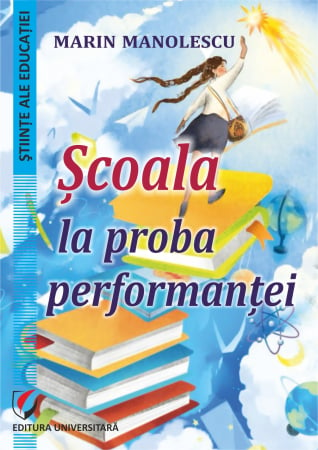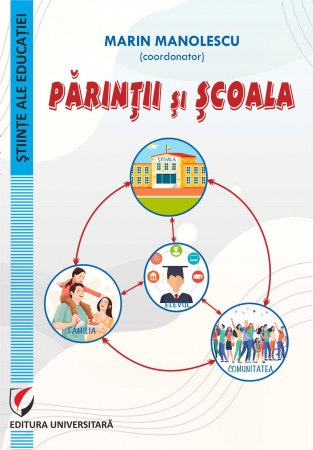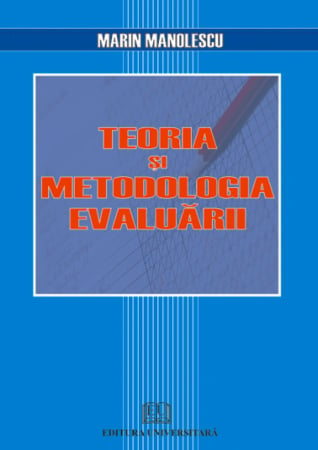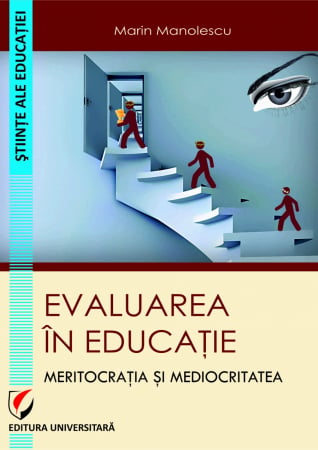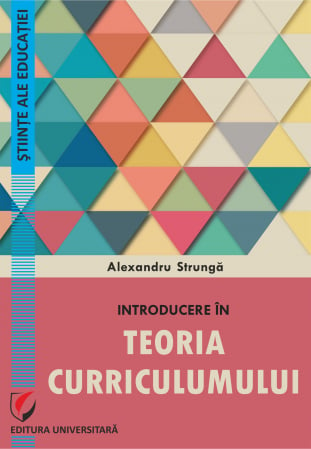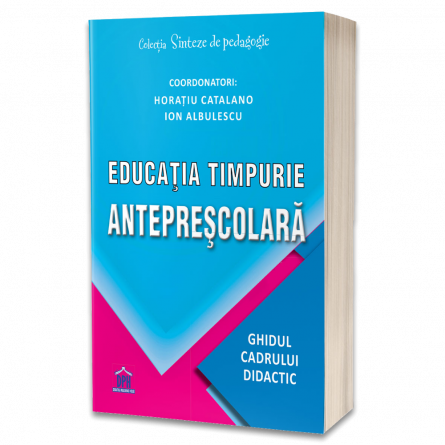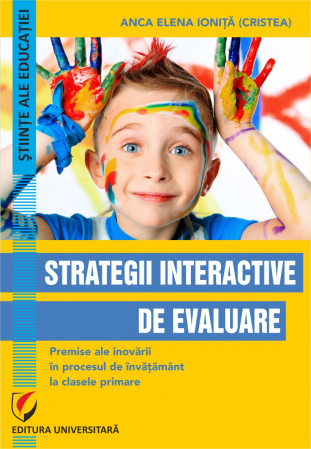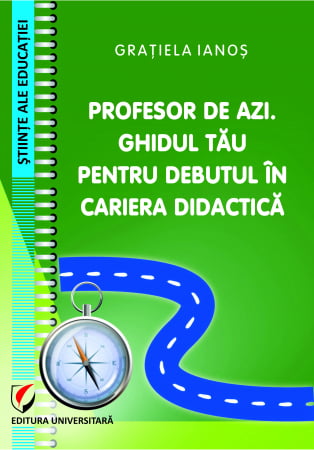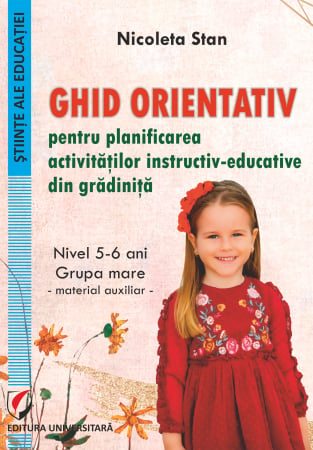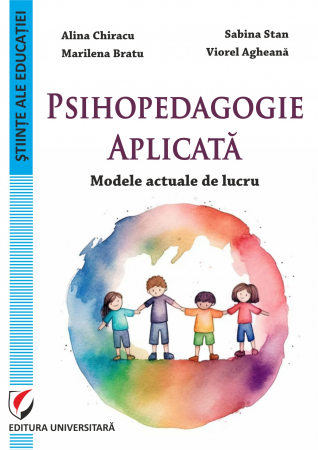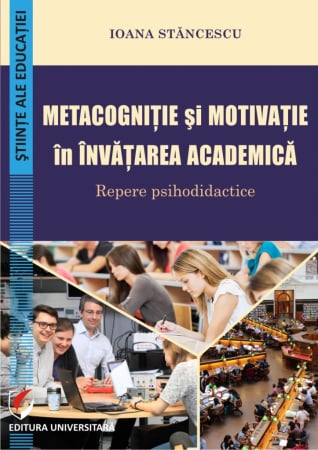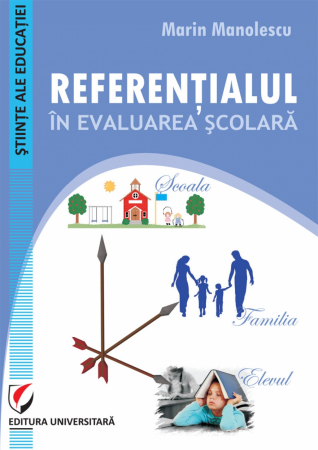Manuscript proposals: [email protected] / 0745 204 115 //// Tracking orders Individuals / Sales: 0745 200 357 / Orders Legal entities: 0721 722 783
Publisher: Editura Universitară
Author: Beatrice Hellen Almasan, Gheorghe Tomsa
ISBN: 978-606-28-1267-6
DOI: https://doi.org/10.5682/9786062812676
Publisher year: 2021
Edition: I
Pages: 274
Product Code:
9786062812676
Do you need help?
0745 200 357
- Description
- Download (1)
- Authors
- More details
- Content
- Reviews (0)
The volume EDUCATIONAL COUNSELING, CAREER COUNSELING AND GUIDANCE AND SCHOOL CONSULTANCY, coordinated by lecturer Dr. Beatrice Almasan and professor emeritus Dr. Gheorghe Tomsa, is defined in the context of the SARS - CoV-2 pandemic and presents educational research and ways of action during this period. .
The paper is addressed to specialists in the field of counseling, but also to teachers in pre-university and university education, as well as parents, pupils and students.
The richness of themes and angles of analysis that we find in the articles of the paper, for example, school counseling, the problem of remigrated children, correlations and analyzes about people in self-isolation, lead us to say that the material will become an important bibliographic source for future researchers in the field of education sciences.
The paper is addressed to specialists in the field of counseling, but also to teachers in pre-university and university education, as well as parents, pupils and students.
The richness of themes and angles of analysis that we find in the articles of the paper, for example, school counseling, the problem of remigrated children, correlations and analyzes about people in self-isolation, lead us to say that the material will become an important bibliographic source for future researchers in the field of education sciences.
-
Educational Counseling, Career Counseling and Guidance and School Consulting
Download
Coordinators:
BEATRICE HELLEN ALMASAN
GHEORGHE TOMSA
BEATRICE HELLEN ALMASAN graduate of the Faculty of Psychology, specialization Psychology, University of Bucharest (UB), graduate of the Independent University Titu Maiorescu, Bucharest. PhD lecturer in the Department of Educational Sciences within the Faculty of Psychology and Educational Sciences (FPSE), UB, member of the Romanian College of Psychologists, main psychologist educational psychology and school counseling. Since 2000 with constant activity regarding distance learning and management of educational groups in face-to-face and online environments. Currently having managerial responsibilities, Director of Institutional Development, Distance Education and Reduced Frequency Education Department, CREDIS.
She is a member of the Center for Research and Promotion of Equity in Education (CCPEE), which is an initiative of the Doctoral School of FPSE and the Department of Educational Sciences in collaboration with the RENINCO Romania Association.
GHEORGHE TOMSA graduated from the Faculty of Philosophy, Department of Pedagogy of the University of Bucharest, in 1971. He obtained his doctorate in pedagogy in 1982. He is currently a PhD professor at the University of Bucharest, Faculty of Psychology and Educational Sciences, with teaching interests and research in the fields of: counseling and professional orientation, psychopedagogy of deviant behavior and knowledge of the student's personality.
As an author and co-author, he has published 9 books and over 35 studies in the fields of professional counseling and guidance, preschool and school pedagogy, as well as in the field of university teaching.
BEATRICE HELLEN ALMASAN
GHEORGHE TOMSA
BEATRICE HELLEN ALMASAN graduate of the Faculty of Psychology, specialization Psychology, University of Bucharest (UB), graduate of the Independent University Titu Maiorescu, Bucharest. PhD lecturer in the Department of Educational Sciences within the Faculty of Psychology and Educational Sciences (FPSE), UB, member of the Romanian College of Psychologists, main psychologist educational psychology and school counseling. Since 2000 with constant activity regarding distance learning and management of educational groups in face-to-face and online environments. Currently having managerial responsibilities, Director of Institutional Development, Distance Education and Reduced Frequency Education Department, CREDIS.
She is a member of the Center for Research and Promotion of Equity in Education (CCPEE), which is an initiative of the Doctoral School of FPSE and the Department of Educational Sciences in collaboration with the RENINCO Romania Association.
GHEORGHE TOMSA graduated from the Faculty of Philosophy, Department of Pedagogy of the University of Bucharest, in 1971. He obtained his doctorate in pedagogy in 1982. He is currently a PhD professor at the University of Bucharest, Faculty of Psychology and Educational Sciences, with teaching interests and research in the fields of: counseling and professional orientation, psychopedagogy of deviant behavior and knowledge of the student's personality.
As an author and co-author, he has published 9 books and over 35 studies in the fields of professional counseling and guidance, preschool and school pedagogy, as well as in the field of university teaching.
I titled this volume "Educational counseling, career counseling and guidance and school counseling" to illustrate the complexity and interdisciplinary nature of the activity carried out by the teacher-counselor - school counseling activity. Derived from the phrase "school counseling" (American English = school counseling), this activity includes three structural components - systemic, namely - a) educational counseling; b) career counseling and guidance; and c) school consulting. Depending on these systemic components we will group the studies included in this volume, as follows.
● Educational counseling
We appreciate that most of the studies included in this volume (more precisely 9 of them) are focused on issues specific to educational counseling. This is an individual or group relationship, ie a confidential form of help, based on supporting the person or persons reconciled to identify and clarify the problems they face. When we talk about educational counseling, we refer both to the human support relationship and to the educational assistance, provided by teachers, counselors and educators, in the school environment.
The object of educational counseling is the diversity of phenomena encountered in the education process, from preschool to university, such as - problems related to learning; absenteeism and school failure; students' learning difficulties; poor relationships between students; poor educational relationships between teacher and students; deficient relationships at the level of the teaching staff; gender relations in the school environment; aggression and violence in the school environment; conflicts in school, etc.
✔ The first study that falls into this category is entitled "Self-image and self-esteem in preschoolers. The role of the two variables in stimulating the creativity of the preschooler in the educational context”, elaborated by Drd. Georgiana Alexandra Basarâm (Serbian). This is a plea of the author for the need to form a positive self-image that would lead to increased self-esteem in preschool children.
This action derives from the child's need to be valued and supported so that he knows himself in order to adapt and develop harmoniously. Through this study, the author aims to address the problems of self-image and self-esteem in preschoolers, with emphasis on the correlation between the two variables.
✔ The second study, included in this category, is entitled "Academic Counseling and Information and Communication Technology, Benefits and Risks in the SARS - CoV-2 Pandemic Context", prepared by Lect. univ. Dr. Beatrice Hellen Almasan. Through her study, the author brings a set of questions and reflections that a tutor counselor can identify, in the pandemic context SARS - CoV-2 of carrying out counseling activities in the online system, with reference to the academic environment.
The author of this study discusses a number of issues, such as - managing emotions, keeping physical distance and hygienic facial mask, keeping the survival backpack, etc. The fundamental question asked by the author refers to the way “How does all this affect our life in the long run and how do we each respond to this isolation / physical distancing?
We also specify that in her study Mrs. Beatrice Almasan aims to approach, from a double perspective, educational counseling and Information and Communication Technology (ICT) in academia, in order to mark the "series of concerns and modalities". through which he managed to continue the daily activities.
✔ The third study in this category is "Professional stress in education", developed by Dr. Daniela Florica Ghita. In her study, the author focuses on professional stress in teachers of mainstream and special education. He referred to the following aspects, namely - the definition of professional stress and its classification; to identify the sources of professional stress and the way in which it manifests itself; stress reactions and how stress can be managed at work; to the way in which the professional stress therapy can intervene.
Finally, the author presents a model for implementing an intervention or counseling plan to reduce and treat occupational stress.
✔ The next study in this category, entitled "Intercultural counseling in the context of remigration in Romania", prepared by Dr. Florentina Ciomaga and Dr. Silviu Daniel Brebulet. The two authors start from the model launched by Nissila and Lairio (2005), which differentiates between intercultural attitudes and beliefs, intercultural knowledge and skills. They investigated this t study, the extent to which each of the three personal characteristics are developed in teacher counselors who work with remigrated children.
We appreciate the fact that the authors of this study obtained data about this training of counselors through the evaluations made by the remigrated students, their parents and by the counseling teachers themselves.
✔ The fifth study included in this category is entitled "Counseling parents in speech therapy - support for children with language disorders, with / without special educational requirements (SEN)", developed by Drd, Adelina Cristina Chesca. Through the present study, the author considers that the provision of support services in the field of speech therapy, in the case of children with language and communication disorders, with / without SEN, both in the face-to-face system and online, also involves parental counseling. them.
According to the author, the speech therapist's work, especially in the online system, must be supported and continued by the child's parents. Through her study, the author presents possible strategies for counseling parents, from a speech therapy point of view, which speech therapist teachers can use in the online system.
The strategies described by the author consist in - presenting letters through which the speech therapist addresses the parents and clarifies some aspects related to the speech therapy approach and its importance; elaboration of an action plan together with the parent; correcting the oral and written language disorders of one's own child.
✔ The sixth study entitled "Adaptation of preadolescents to the school and social environment in the context of parental migration", developed by Drd. Maria Antoaneta Vasilescu (Stanciu). In essence, this study presents the case of a 12-year-old preadolescent, a student from a school on the outskirts of Bucharest, left in the care of his father and paternal grandmother, following the temporary migration of his mother to work in Greece. The present study aims to evaluate the adaptive capacity of the preadolescent and to find some ways to improve his emotional state.
The results obtained by the author, in her research, reveal that the preadolescent encounters difficulties of school adaptation, both after the mother's departure and after her temporary return to the country. These results also attest to the fact that the preadolescent feels the need for emotional expression and affection of the mother, he seeks the attachment of females.
✔ The seventh study, entitled "The psychosocial climate of the classroom and attitudes in resolving conflicts in adolescents", prepared by Prof. gr. And Mariana Soare. As it is known, the psychosocial climate of the class designates subjective states, determined by the dynamics of the students' class and targets the atmosphere, the morale and the affective state of the class.
In this study, the author aimed to investigate the attitudes manifested by adolescents towards conflicts, as well as differences in communication styles, depending on the climate of the class to which they belong. The results of the investigations revealed that adolescents who are part of a class in which the positive or negative psychosocial climate predominates, they tend to show appropriate attitudes towards conflicts.
Also, these results highlighted the fact that in the classes where the psychosocial climate was perceived as negative, the number of students in whom the aggressive communication style predominated was much higher than the number of students with assertive communication style.
✔ The eighth study entitled "Study of the correlation between anxiety, self-esteem and personality traits in people who are in self-isolation", developed by Dr. Anca Mihaela Antonie and Hania Hassan. According to the two authors, the research undertaken by their lords aimed to analyze the influence of anxiety on self-esteem and personality traits in people who are in self-isolation.
The statistical results obtained highlighted the fact that between anxiety and self-esteem there is a significant inversely proportional relationship, which was also manifested between anxiety and conscientiousness. Moreover, the statistical data obtained also showed a significant direct relationship between anxiety and neuroticism.
✔ The ninth study, the last in the category of those included in the category "Educational counseling" and entitled "The relationship between self-esteem, personal development and aggressive behavior in preadolescents", developed by Drd. Irina Toma (Banu). It is a study in which the author analyzed the relationship between self-esteem and aggressive behavior of preadolescent students.
● Counseling and career guidance
The main objective of this study was to highlight the development and implementation of methods for self-esteem by creating a program personalized counseling, structured on several modules. In the second systemic component of school counseling we included the three studies focused on
"Career counseling and guidance".
This activity in the field of school counseling, although it contains problems closely related to educational counseling, refers to the provision of information, counseling and guidance services, in order to support the student and, later, the adult at any stage of his life, for capacity development. of choice, planning and career development, by making appropriate decisions in the field of education, work and community life.
Overall, career counseling differs from educational counseling by the nature of the issues it addresses, namely - work issues, profession issues, and therefore career issues. Regarding the career orientation, this phrase designates a set of educational actions, with psychological, social, economic, medical, ergonomic and ethical implications, etc. This set of actions has as essential objective the preparation of students for the choice of future studies and profession, that is career education.
✔ The first study in this category is entitled “The decision-making act in choosing a career at the age of adolescence. Models and theories”, elaborated by Drd. Sanda Nicoleta (Popescu). The career decision is a specific, conscious and premeditated process. It has a prospective character because it prepares a person's future path. This decision is a mechanism that can trigger both the process of knowledge and the process of self-knowledge that is necessary in achieving a concordance between skills, interests, values and motivations.
Many researchers have looked at how teens make decisions about their careers. Often, models and theories start from a number of aspects, such as - the factors that influence the choice of a career or the particularities related to the personality of adolescents. In this study, the author presents some of the theories and models that underlie research on the decision-making process for career choice by adolescents.
✔ The second study that we included in this systemic component of school counseling is entitled "The situation of the web pages of the Career Counseling and Guidance Centers within the state higher education institutions in Romania", elaborated by Drd. Alexandru Mihai Cartis. We specify the fact that the Career Counseling and Guidance Centers (CCOC) were recently established within the university educational institutions in our country. They came to meet the needs of educational programs to constantly relate to the needs of our economic, social and cultural space.
Through the directives and recommendations existing in the university educational institutions, the activity of these centers (CCOC) must always be reported and controlled, so that it can offer students and graduates counseling and guidance activities of a high quality level. In this study, the author aims to see how many of the state university institutions in our country make available to those interested the web pages of Career Counseling and Guidance Centers, as well as the types of activities and programs found on these web pages.
✔ The third study, entitled “Student Counseling Services. Needs and limits”, is elaborated by Assoc. Dr. Camelia Staiculescu. The present study as well as the practices bring a series of arguments regarding the necessity of providing counseling services to the students, by referring to the theories of counseling and the age characteristics of the current generations. This study analyzes the counseling services in Romanian universities, the legislation that regulates the provision of these services, as well as the practices offered at the university level.
Also, the study brings a series of recommendations regarding the organization and development of student counseling services during the student period in universities. As it is known, most students have to make options for further studies, for a future career and for a lifestyle.
In other words, the student period can be characterized by attributes, such as - change and choice; the decision whether to commit or pay more attention to academic training; if they build their professional experiences and how to capitalize on their existing opportunities; how to promote and how to capitalize on the qualities they have, etc.
✔ The fourth study by the author Drd. Dana Amarazeanu, entitled "Program to stimulate creativity in adolescents", presents the results of the Counseling Program carried out in the context of preparing a robotics project with which the subjects participated in the First Lego League school competition.
The present program The aim of this paper is to train adolescents in innovative attitudes towards knowledge, life skills and strategies indispensable to contemporary man.
The activities carried out within the program are integrated in the instructive-educational process in the school, were designed according to the particularities of the students' age and preoccupations and took place in the school computer laboratory.
First Lego League is a STEM educational program, dedicated to children and adolescents (9-17 years old), which aims to introduce them to the fascinating world of science and technology, through a sports approach. First Lego League is the most important competition in the field of technology and robotics dedicated to children and adolescents and currently takes place in over 80 countries, with over 500,000 participating children. The competition aims to increase young people's interest in science, technology, engineering and mathematics (STEM) and to motivate them to pursue a career in these fields, to encourage children and adolescents to solve complex tasks in a creative way, to teach them critical thinking and teamwork. At the end of the program to stimulate creativity was presented
The "creativity diary" made by each teenager during the nine sessions. Each participant chose a sequence from their own diary, exposed it to colleagues presenting the value that the respective experience had for themselves.
● School consulting
Finally, the last systemic component of school counseling is school counseling. This component is a process of interaction between two professionals - the consultant and the consulted, an interaction in which the latter asks for the help of the former, in connection with a current problem. The term consulting subsumes a series of activities and relationships.
This concept describes not only the relationship between two professionals, but also the agents contacted by them. Overall, the concept of consulting describes any type of cooperation between professionals in various categories and fields of activity. In the school environment, this activity represents a set of problems constituted in a process carried out between the counselor teacher and a person or a group of people responsible for the good of another person.
In other words, we speak of consulting when - a) the relationship is focused on the third person; and b) the relationship is based on collaboration on identifying ways to help the third person. In conclusion, in the case of school counseling the consultant is the counselor teacher, and the other person is an adult - teacher, parent or administrator of the school organization. Therefore, in the case of school consulting we are talking about - a) teacher consulting; b) parental counseling; c) consulting the director as manager; d) administrative consulting; and e) program consulting.
At the last component of school counseling - School consulting, we have a single study, entitled "Consulting in the school environment", a study developed by Prof. univ. Dr. Gheorghe Tomsa. For the first time, he published on the topic of school consulting, in 2011, in a paper entitled "General approaches to school counseling and consulting", at Terra Publishing House in Focsani.
In this study, the author presents some elements regarding the genesis of school consulting, from the initial position of G. Caplan (1970) to the theoretical perspectives on school consulting to the methods most frequently used in this process.
We consider that on the whole, the studies included in this volume will be useful for the counseling teachers in Romanian education, for the master students in school counseling and psychotherapy, for the teachers and for the parents of the students.
Prof. univ. Dr. Gheorghe Tomsa
● Educational counseling
We appreciate that most of the studies included in this volume (more precisely 9 of them) are focused on issues specific to educational counseling. This is an individual or group relationship, ie a confidential form of help, based on supporting the person or persons reconciled to identify and clarify the problems they face. When we talk about educational counseling, we refer both to the human support relationship and to the educational assistance, provided by teachers, counselors and educators, in the school environment.
The object of educational counseling is the diversity of phenomena encountered in the education process, from preschool to university, such as - problems related to learning; absenteeism and school failure; students' learning difficulties; poor relationships between students; poor educational relationships between teacher and students; deficient relationships at the level of the teaching staff; gender relations in the school environment; aggression and violence in the school environment; conflicts in school, etc.
✔ The first study that falls into this category is entitled "Self-image and self-esteem in preschoolers. The role of the two variables in stimulating the creativity of the preschooler in the educational context”, elaborated by Drd. Georgiana Alexandra Basarâm (Serbian). This is a plea of the author for the need to form a positive self-image that would lead to increased self-esteem in preschool children.
This action derives from the child's need to be valued and supported so that he knows himself in order to adapt and develop harmoniously. Through this study, the author aims to address the problems of self-image and self-esteem in preschoolers, with emphasis on the correlation between the two variables.
✔ The second study, included in this category, is entitled "Academic Counseling and Information and Communication Technology, Benefits and Risks in the SARS - CoV-2 Pandemic Context", prepared by Lect. univ. Dr. Beatrice Hellen Almasan. Through her study, the author brings a set of questions and reflections that a tutor counselor can identify, in the pandemic context SARS - CoV-2 of carrying out counseling activities in the online system, with reference to the academic environment.
The author of this study discusses a number of issues, such as - managing emotions, keeping physical distance and hygienic facial mask, keeping the survival backpack, etc. The fundamental question asked by the author refers to the way “How does all this affect our life in the long run and how do we each respond to this isolation / physical distancing?
We also specify that in her study Mrs. Beatrice Almasan aims to approach, from a double perspective, educational counseling and Information and Communication Technology (ICT) in academia, in order to mark the "series of concerns and modalities". through which he managed to continue the daily activities.
✔ The third study in this category is "Professional stress in education", developed by Dr. Daniela Florica Ghita. In her study, the author focuses on professional stress in teachers of mainstream and special education. He referred to the following aspects, namely - the definition of professional stress and its classification; to identify the sources of professional stress and the way in which it manifests itself; stress reactions and how stress can be managed at work; to the way in which the professional stress therapy can intervene.
Finally, the author presents a model for implementing an intervention or counseling plan to reduce and treat occupational stress.
✔ The next study in this category, entitled "Intercultural counseling in the context of remigration in Romania", prepared by Dr. Florentina Ciomaga and Dr. Silviu Daniel Brebulet. The two authors start from the model launched by Nissila and Lairio (2005), which differentiates between intercultural attitudes and beliefs, intercultural knowledge and skills. They investigated this t study, the extent to which each of the three personal characteristics are developed in teacher counselors who work with remigrated children.
We appreciate the fact that the authors of this study obtained data about this training of counselors through the evaluations made by the remigrated students, their parents and by the counseling teachers themselves.
✔ The fifth study included in this category is entitled "Counseling parents in speech therapy - support for children with language disorders, with / without special educational requirements (SEN)", developed by Drd, Adelina Cristina Chesca. Through the present study, the author considers that the provision of support services in the field of speech therapy, in the case of children with language and communication disorders, with / without SEN, both in the face-to-face system and online, also involves parental counseling. them.
According to the author, the speech therapist's work, especially in the online system, must be supported and continued by the child's parents. Through her study, the author presents possible strategies for counseling parents, from a speech therapy point of view, which speech therapist teachers can use in the online system.
The strategies described by the author consist in - presenting letters through which the speech therapist addresses the parents and clarifies some aspects related to the speech therapy approach and its importance; elaboration of an action plan together with the parent; correcting the oral and written language disorders of one's own child.
✔ The sixth study entitled "Adaptation of preadolescents to the school and social environment in the context of parental migration", developed by Drd. Maria Antoaneta Vasilescu (Stanciu). In essence, this study presents the case of a 12-year-old preadolescent, a student from a school on the outskirts of Bucharest, left in the care of his father and paternal grandmother, following the temporary migration of his mother to work in Greece. The present study aims to evaluate the adaptive capacity of the preadolescent and to find some ways to improve his emotional state.
The results obtained by the author, in her research, reveal that the preadolescent encounters difficulties of school adaptation, both after the mother's departure and after her temporary return to the country. These results also attest to the fact that the preadolescent feels the need for emotional expression and affection of the mother, he seeks the attachment of females.
✔ The seventh study, entitled "The psychosocial climate of the classroom and attitudes in resolving conflicts in adolescents", prepared by Prof. gr. And Mariana Soare. As it is known, the psychosocial climate of the class designates subjective states, determined by the dynamics of the students' class and targets the atmosphere, the morale and the affective state of the class.
In this study, the author aimed to investigate the attitudes manifested by adolescents towards conflicts, as well as differences in communication styles, depending on the climate of the class to which they belong. The results of the investigations revealed that adolescents who are part of a class in which the positive or negative psychosocial climate predominates, they tend to show appropriate attitudes towards conflicts.
Also, these results highlighted the fact that in the classes where the psychosocial climate was perceived as negative, the number of students in whom the aggressive communication style predominated was much higher than the number of students with assertive communication style.
✔ The eighth study entitled "Study of the correlation between anxiety, self-esteem and personality traits in people who are in self-isolation", developed by Dr. Anca Mihaela Antonie and Hania Hassan. According to the two authors, the research undertaken by their lords aimed to analyze the influence of anxiety on self-esteem and personality traits in people who are in self-isolation.
The statistical results obtained highlighted the fact that between anxiety and self-esteem there is a significant inversely proportional relationship, which was also manifested between anxiety and conscientiousness. Moreover, the statistical data obtained also showed a significant direct relationship between anxiety and neuroticism.
✔ The ninth study, the last in the category of those included in the category "Educational counseling" and entitled "The relationship between self-esteem, personal development and aggressive behavior in preadolescents", developed by Drd. Irina Toma (Banu). It is a study in which the author analyzed the relationship between self-esteem and aggressive behavior of preadolescent students.
● Counseling and career guidance
The main objective of this study was to highlight the development and implementation of methods for self-esteem by creating a program personalized counseling, structured on several modules. In the second systemic component of school counseling we included the three studies focused on
"Career counseling and guidance".
This activity in the field of school counseling, although it contains problems closely related to educational counseling, refers to the provision of information, counseling and guidance services, in order to support the student and, later, the adult at any stage of his life, for capacity development. of choice, planning and career development, by making appropriate decisions in the field of education, work and community life.
Overall, career counseling differs from educational counseling by the nature of the issues it addresses, namely - work issues, profession issues, and therefore career issues. Regarding the career orientation, this phrase designates a set of educational actions, with psychological, social, economic, medical, ergonomic and ethical implications, etc. This set of actions has as essential objective the preparation of students for the choice of future studies and profession, that is career education.
✔ The first study in this category is entitled “The decision-making act in choosing a career at the age of adolescence. Models and theories”, elaborated by Drd. Sanda Nicoleta (Popescu). The career decision is a specific, conscious and premeditated process. It has a prospective character because it prepares a person's future path. This decision is a mechanism that can trigger both the process of knowledge and the process of self-knowledge that is necessary in achieving a concordance between skills, interests, values and motivations.
Many researchers have looked at how teens make decisions about their careers. Often, models and theories start from a number of aspects, such as - the factors that influence the choice of a career or the particularities related to the personality of adolescents. In this study, the author presents some of the theories and models that underlie research on the decision-making process for career choice by adolescents.
✔ The second study that we included in this systemic component of school counseling is entitled "The situation of the web pages of the Career Counseling and Guidance Centers within the state higher education institutions in Romania", elaborated by Drd. Alexandru Mihai Cartis. We specify the fact that the Career Counseling and Guidance Centers (CCOC) were recently established within the university educational institutions in our country. They came to meet the needs of educational programs to constantly relate to the needs of our economic, social and cultural space.
Through the directives and recommendations existing in the university educational institutions, the activity of these centers (CCOC) must always be reported and controlled, so that it can offer students and graduates counseling and guidance activities of a high quality level. In this study, the author aims to see how many of the state university institutions in our country make available to those interested the web pages of Career Counseling and Guidance Centers, as well as the types of activities and programs found on these web pages.
✔ The third study, entitled “Student Counseling Services. Needs and limits”, is elaborated by Assoc. Dr. Camelia Staiculescu. The present study as well as the practices bring a series of arguments regarding the necessity of providing counseling services to the students, by referring to the theories of counseling and the age characteristics of the current generations. This study analyzes the counseling services in Romanian universities, the legislation that regulates the provision of these services, as well as the practices offered at the university level.
Also, the study brings a series of recommendations regarding the organization and development of student counseling services during the student period in universities. As it is known, most students have to make options for further studies, for a future career and for a lifestyle.
In other words, the student period can be characterized by attributes, such as - change and choice; the decision whether to commit or pay more attention to academic training; if they build their professional experiences and how to capitalize on their existing opportunities; how to promote and how to capitalize on the qualities they have, etc.
✔ The fourth study by the author Drd. Dana Amarazeanu, entitled "Program to stimulate creativity in adolescents", presents the results of the Counseling Program carried out in the context of preparing a robotics project with which the subjects participated in the First Lego League school competition.
The present program The aim of this paper is to train adolescents in innovative attitudes towards knowledge, life skills and strategies indispensable to contemporary man.
The activities carried out within the program are integrated in the instructive-educational process in the school, were designed according to the particularities of the students' age and preoccupations and took place in the school computer laboratory.
First Lego League is a STEM educational program, dedicated to children and adolescents (9-17 years old), which aims to introduce them to the fascinating world of science and technology, through a sports approach. First Lego League is the most important competition in the field of technology and robotics dedicated to children and adolescents and currently takes place in over 80 countries, with over 500,000 participating children. The competition aims to increase young people's interest in science, technology, engineering and mathematics (STEM) and to motivate them to pursue a career in these fields, to encourage children and adolescents to solve complex tasks in a creative way, to teach them critical thinking and teamwork. At the end of the program to stimulate creativity was presented
The "creativity diary" made by each teenager during the nine sessions. Each participant chose a sequence from their own diary, exposed it to colleagues presenting the value that the respective experience had for themselves.
● School consulting
Finally, the last systemic component of school counseling is school counseling. This component is a process of interaction between two professionals - the consultant and the consulted, an interaction in which the latter asks for the help of the former, in connection with a current problem. The term consulting subsumes a series of activities and relationships.
This concept describes not only the relationship between two professionals, but also the agents contacted by them. Overall, the concept of consulting describes any type of cooperation between professionals in various categories and fields of activity. In the school environment, this activity represents a set of problems constituted in a process carried out between the counselor teacher and a person or a group of people responsible for the good of another person.
In other words, we speak of consulting when - a) the relationship is focused on the third person; and b) the relationship is based on collaboration on identifying ways to help the third person. In conclusion, in the case of school counseling the consultant is the counselor teacher, and the other person is an adult - teacher, parent or administrator of the school organization. Therefore, in the case of school consulting we are talking about - a) teacher consulting; b) parental counseling; c) consulting the director as manager; d) administrative consulting; and e) program consulting.
At the last component of school counseling - School consulting, we have a single study, entitled "Consulting in the school environment", a study developed by Prof. univ. Dr. Gheorghe Tomsa. For the first time, he published on the topic of school consulting, in 2011, in a paper entitled "General approaches to school counseling and consulting", at Terra Publishing House in Focsani.
In this study, the author presents some elements regarding the genesis of school consulting, from the initial position of G. Caplan (1970) to the theoretical perspectives on school consulting to the methods most frequently used in this process.
We consider that on the whole, the studies included in this volume will be useful for the counseling teachers in Romanian education, for the master students in school counseling and psychotherapy, for the teachers and for the parents of the students.
Prof. univ. Dr. Gheorghe Tomsa
1. Introduction / 7
2. Self-image and self-esteem in preschoolers. The role of the two variables in stimulating the creativity of the preschooler in an educational context - Georgiana Alexandra Basaram (Serbian) / 13
3. Academic Counseling and Information and Communication Technology, Benefits and Risks in the SARS – CoV-2 Pandemic Context - Beatrice Hellen Almasan / 32
4. Professional stress in education - Daniela Florica Ghita / 44
5. Intercultural counseling in the context of remigration in Romania - Florentina Ciomaga, Silviu Daniel Brebulet / 66
6. Counseling parents in the speech therapy approach - support for the child with language disorders, with / without special educational requirements (SEN) - Adelina-Cristina Chesca / 83
7. Adaptation of preadolescents to the school and social environment in the context of parental migration - Maria-Antoaneta Vasilescu (Stanciu) / 94
8. The psychosocial climate of the class and attitudes in resolving conflicts in adolescents - Mariana Soare / 115
9. Study of correlation between anxiety, self-esteem and personality traits in people who are in self-isolation - Anca Mihaela Antonie, Hania Hassan / 137
10. The relationship between self-esteem, personal development and aggressive behavior in preadolescents - Irina Toma (Banu) / 159
11. The decisional act in choosing the career at the age of adolescence. Models and theories - Nicoleta Sanda (Popescu) / 173
12. The situation of the web pages of the counseling and career guidance centers within the state higher education institutions in Romania - Alexandru-Mihai Cartis / 200
13. Counseling services for students. Needs and limits - Camelia Staiculescu / 214
14. Program to stimulate creativity in adolescents - Dana Amazareanu / 229
15. Consulting in the school environment - Gheorghe Tomsa / 253
2. Self-image and self-esteem in preschoolers. The role of the two variables in stimulating the creativity of the preschooler in an educational context - Georgiana Alexandra Basaram (Serbian) / 13
3. Academic Counseling and Information and Communication Technology, Benefits and Risks in the SARS – CoV-2 Pandemic Context - Beatrice Hellen Almasan / 32
4. Professional stress in education - Daniela Florica Ghita / 44
5. Intercultural counseling in the context of remigration in Romania - Florentina Ciomaga, Silviu Daniel Brebulet / 66
6. Counseling parents in the speech therapy approach - support for the child with language disorders, with / without special educational requirements (SEN) - Adelina-Cristina Chesca / 83
7. Adaptation of preadolescents to the school and social environment in the context of parental migration - Maria-Antoaneta Vasilescu (Stanciu) / 94
8. The psychosocial climate of the class and attitudes in resolving conflicts in adolescents - Mariana Soare / 115
9. Study of correlation between anxiety, self-esteem and personality traits in people who are in self-isolation - Anca Mihaela Antonie, Hania Hassan / 137
10. The relationship between self-esteem, personal development and aggressive behavior in preadolescents - Irina Toma (Banu) / 159
11. The decisional act in choosing the career at the age of adolescence. Models and theories - Nicoleta Sanda (Popescu) / 173
12. The situation of the web pages of the counseling and career guidance centers within the state higher education institutions in Romania - Alexandru-Mihai Cartis / 200
13. Counseling services for students. Needs and limits - Camelia Staiculescu / 214
14. Program to stimulate creativity in adolescents - Dana Amazareanu / 229
15. Consulting in the school environment - Gheorghe Tomsa / 253
If you want to express your opinion about this product you can add a review.
write a review

6359.png)
![Educational Counseling, Career Counseling and Guidance and School Consulting [1] Educational Counseling, Career Counseling and Guidance and School Consulting [1]](https://gomagcdn.ro/domains/editurauniversitara.ro/files/product/large/almasan_consiliere-edu_bt-3094-6323.jpg)
